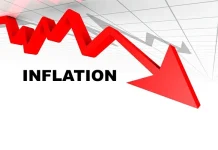🌿 Ruzu Non-Alcoholic Herbal Bitters
Ruzu Non-Alcoholic Herbal Bitters is a natural health supplement specially formulated to:
- ✅ Promote general wellness
- ✅ Detoxify the body
- ✅ Support the treatment of various ailments
Made from a powerful blend of 100% organic and medicinal herbs, Ruzu is completely alcohol-free, making it ideal for:
- 👪 All age groups
- 🌱 Health-conscious individuals
- 🌿 Anyone seeking non-alcoholic herbal remedies
Whether you're looking to boost your vitality, cleanse your system, or support healing the natural way, Ruzu Bitters offers a trusted herbal solution.
According to data released by the Debt Management Office (DMO), Nigeria’s public debt profile increased from N134.3 trillion in June 2024 to N142.32 trillion on September 30, 2024.
When N142.32 trillion is divided by the estimated 216.78 million people living in Nigeria, the most recent statistic indicates that each Nigerian may owe roughly N656,514 in debt stock per capita.
Nonetheless, the DMO claimed that the debt stock included both domestic and foreign borrowings, implying that the external debt was converted to Naira at the Central Bank of Nigeria’s (CBN) official exchange rate of N1,601.028/$1 as of September 30, 2024, as opposed to N1,470.19/$1 as of June 30, 2024.
Because of the impact of the naira’s depreciation against the dollar, Nigeria’s public debt increased from $91.35 billion in June 2024 to $88.89 billion in September 2024, indicating a greater debt profile.
Domestic debt increased from N71.22 trillion to N73.43 trillion, while external debt increased from N63.07 trillion to N68.89 trillion. Since the federal government issued $2.2 billion Eurobonds in December of last year, it is anticipated to increase even more by the fourth quarter.
According to the DMO’s data, the Federal Government of Nigeria (FGN) owes N69.22 trillion, while the 36 states and Federal Capital Territory (FCT) owe N4.21 trillion of the domestic debt stock.
According to a quick glance at the debt stock, the FGN domestic debt stock grew from N66.96 trillion in June 2024 to N69.22 trillion in September 2024. This increase may have been caused by a rise in the issuance of FGN bonds and other fixed-income securities.
Nevertheless, throughout the review period, the states’ and FCT’s debt stock decreased from N4.27 trillion to N4.21 trillion.
A closer look at the DMO’s data reveals that the weight of domestic debt is 51.60 percent more than that of external debt, which is 48.40 percent.
The DMO claims that all other states and the Federal Capital Territory have domestic debt stocks as of September 2024, with the exception of Cross Rivers State, which had them as of June 30, 2024.
Concerns about Nigeria’s debt sustainability have been raised by the country’s rising debt profile, particularly in light of the exchange rate volatility that has increased the cost of external obligations in local currency.
In the face of limited foreign exchange reserves, the federal government’s increasing reliance on local markets to fund budget deficits is highlighted by the overall rise in domestic debt.
The government is proposing N15.81 trillion for debt payments in the 2024 budget estimates, which has economic observers concerned about the risk exposure of Nigerians.
According to Ayo Teriba, CEO of Economy Associates, “borrowing is not criminal because the country faces serious infrastructure challenges, but borrowing to pay interest on outstanding debts is wrong.”
Most notably, Nigerians are upset over the Tinubu-led government’s propensity to take on additional debt while the nation struggles to pay off its obligations and its crumbling infrastructure.
Despite these massive debts, officials continue to lead extravagant lives, prioritizing long convoys over essential infrastructure like affordable housing, a good and accessible primary health center, and well-maintained roads.
Financial analysts have often expressed doubts about the sustainability of the growing debt levels, especially as interest payments take up a sizable amount of government revenue.
Read Also: Nigeria Makes Super 6 in Cricket World Cup Despite South Africa Hurdle
Over 96% of Nigeria’s 2022 revenue was used to pay down debt, according to a World Bank assessment last year. The ongoing fiscal imbalance has also made the nation’s public debt stock worse.
Economic analysts, aside from the World Bank, maintain that Nigeria’s desire for Eurobonds exposes the country to greater currency concerns brought on by the unstable exchange rate.
Since the Eurobond is commercial debt, we should be concerned about the interest rate we pay on it. Additionally, the interest rates on Treasury bills and Federal Government bonds are currently excessively high. “From the perspective of debt servicing, these factors put a lot of strain on government finances,” Muda Yusuf, the former director-general of the Lagos Chamber of Commerce and Industry (LCCI) and the CEO of the Center for the Promotion of Private Enterprise (CPPE), stated.
Yusuf added that it is crucial that Nigeria’s exposure to Eurobonds be significantly decreased moving forward.
He emphasized that “I believe we need to be more cautious at the rate at which we accumulate these debts because increasing debt will create challenges of rising debt service commitments.”
The depreciation of the naira from N1,470.19/$ to N1,601.03/$ between June and September 2024 made the burden of external debt in local currency even more severe.
In the 2025 budget that is presently being examined by the National Assembly, President Bola Tinubu has suggested a N13.08 trillion deficit and N15.81 trillion in debt servicing.
The President presented the N47.90 trillion 2025 budget to the National Assembly in December 2024 for approval.
According to the projected budget, N34.82 trillion will be generated in income, 2.06 million barrels of crude oil per day (mbpd) will be produced, 15% inflation will occur, and the naira-dollar exchange rate will be N1,500.
















